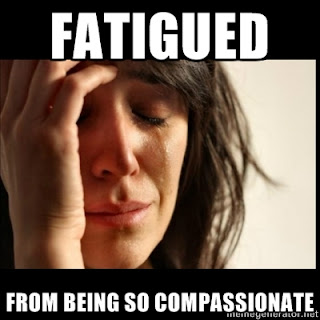 |
| It seems like a first world problem, but it's a real thing. |
 |
| Thanks to us she will never be a mother. She will only be adorable. |
I had been up for 12 hours with a two hour nap already before I started my 10 hour night at 9pm. It had been a long weekend already and I was feeling it. The ER side of our hospital was fairly slow, thank goodness, but ICU was hopping. After 3am I was all alone, and had just gotten word that a dog who had had surgery earlier in the day was not doing well and needed to go back in. She was set up on one of our open "pods" and getting transfusions until our surgeon came. But it wasn't even her that set me off.
 |
| This is pretty much how I was feeling by then. |
She was not even close to the sickest animal in the ICU, but I could see that she didn't have much time left. Even with the diabetes under control, she was just old. I started to think about her owner, and how devastated I would be if this were my dog and she passed. She was adorable, sweet, and full of love even though she wasn't feeling well. Suddenly I wanted to cry, and go home.
 |
| Just so you don't get too sad, here's a horse with a cone on its head. |
It's important to appreciate the people in this industry, and think about the situations we have to go through and deal with daily. It's important for us to appreciate each other, something I think we often forget to do. And it's important for us to appreciate ourselves.
 |
| Animals can't talk, but they thank us every day in their own ways. That's why we do this. |
No comments:
Post a Comment